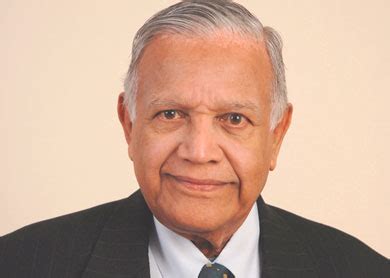A Quote by Peter Maurer
Since 1989, public alarm at the prospect of atomic Armageddon has quietened, but the number of nuclear-armed states has increased, arsenals are being modernized, and powerful states remain convinced that a nuclear security umbrella is vital to national defense, domestic prestige, and geopolitical clout.
Related Quotes
But elimination will only happen if all countries - nuclear and non-nuclear states - genuinely work towards this result. Nuclear states must abolish their arsenals, as was indicated by the unanimous opinion of the international Court of Justice, the highest international tribunal. The five nuclear states seem to expect others to refrain from obtaining bombs while at the same time maintaining their own caches of deadly weapons.
For the United States to recommit itself to the obligation that we undertook in the Nuclear Non-Proliferation Treaty that many other states undertook, which was to work towards disarmament and the eventual elimination of nuclear weapons, is something that manifestly serves our national security interests.
Negotiations with Iran, especially, will not be easy under any circumstances, but I suspect that they might be somewhat less difficult if the nuclear-weapon states could show that their requests are part of a broader effort to lead the world, including themselves, toward nuclear disarmament. Preventing further proliferation is essential, but it is not a recipe for success to preach to the rest of the world to stay away from the very weapons that nuclear states claim are indispensable to their own security.
On nuclear war, actions in Syria and at the Russian border raise very serious threats of confrontation that might trigger war, an unthinkable prospect. Furthermore, Trump's pursuit of Obama's programs of modernization of the nuclear forces poses extraordinary dangers. As we have recently learned, the modernized U.S. nuclear force is seriously fraying the slender thread on which survival is suspended.
One of the most serious [challenges] is increased military spending and the cost of maintaining and developing nuclear arsenals. Enormous resources are being consumed for these purposes, when they could be spent on the development of peoples, especially those who are poorest. For this reason I firmly hope that, during the Nuclear Non-Proliferation Treaty Review Conference to be held this May in New York, concrete decisions will be made towards progressive disarmament, with a view to freeing our planet from nuclear arms
What is the only provocation that could bring about the use of nuclear weapons? Nuclear weapons. What is the priority target for nuclear weapons? Nuclear weapons. What is the only established defense against nuclear weapons? Nuclear weapons. How do we prevent the use of nuclear weapons? By threatening to use nuclear weapons. And we can't get rid of nuclear weapons, because of nuclear weapons. The intransigence, it seems, is a function of the weapons themselves.
One of the greatest concerns that I had when I became President was the vast array of nuclear weapons in the arsenals of the United States and the Soviet Union and a few other countries, and also the great proliferation of conventional weapons, non-nuclear weapons, particularly as a tremendous burden on the economies of developing or very poor countries.

































